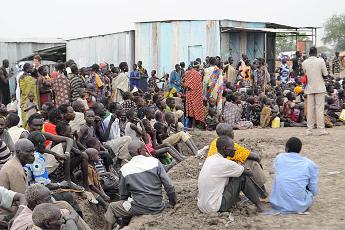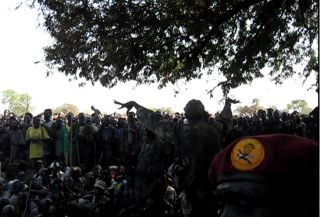South Sudan calls for discipline during Jonglei disarmament
February 27,2012 (JUBA) – South Sudan has called on the new nation’s military, the Sudan People’s Liberation Amy (SPLA), to exhibit discipline as it embarks on a potentially volatile disarmament campaign which begins in three days time.

After 120,000 people were displaced by fighting in December and January South Sudan has vowed to disarm cattle herders in Jonglei, where raids and counter raids have killed well over 1,000 people in the last year.
South Sudan’s president, Salva Kiir Mayardit, has said that the SPLA and police will fight those who refuse to hand over their weapons when the disarmament campaign begins on 1 March.
Initially the emphasis will be on voluntary hand overs but Kiir made it clear that force would be used if the Luo Nuer, Murle and Dinka Bor groups in Jonglei refuse to disarm.
Previous SPLA disarmament campaigns in Jonglei and other parts of South Sudan has led to fighting, with some groups not seeing the SPLA as a neutral body. Minority groups often claim that larger tribes, with better political connections at state and national level are not as thoroughly disarmed, leaving them vulnerable to attack.
The thousands arms in the hands of civilians in Jonglei are a hangover from South Sudan’s two decade long conflict with the north of Sudan. Since South Sudan seceded from the north last year, officials in Juba have accused the north of arming rebels groups in Jonglei and other areas exacerbating the proliferation of small arms.
General Duot described the Jonglei disarmament campaign as a “national duty”, urging the officers responsible to judiciously carry out the process with sense of respect and responsibility.
“DISCRIMINATORY” DISARMAMENT
South Sudan’s government is faced with a similar disarmament issues along the borders of Warrap, Unity and Lakes states, where cattle raiding resulting in deaths, displacement and destruction of property is common.
Members of parliament in Juba who represent Warrap and Lakes state told South Sudan’s Vice President Riek Machar earlier this month that previous disarmament campaigns have been unsuccessful as they were perceived as being discriminatory, putting some groups at a disadvantage.
They also warned the government in Juba not to depend solely on the word of state governors as they claimed some ethnic groups are overlooked by the SPLA in the disarmament process.
The SPLA went from being a rebel movement, with a patchwork regional and tribally based allegiances, to the official army of South Sudan in 2005 when it’s political wing the Sudan People’s Liberation Movement (SPLM) signed a peace deal with north Sudan, giving the region self rule. Seven years on the SPLA is now the national army of the Republic of South Sudan, after the South Sudanese voted overwhelmingly for independence last year.
UN SAYS ARMY NEEDS TO BE DOWNSIZED
The military is highly influential in South Sudan with many politicians also holding positions in the army, including the President, ministers and state governors. Military spending accounts for 27% of the government’s budget.
Juba has vowed not to cut the salaries of the security services and civil servants, despite an oil dispute with north Sudan depriving the government of 98% of its revenue.
In an interview with the BBC earlier this month the head of the UN Mission in South Sudan (UNMISS) Hilde Johnson said there was a “likelihood” that the loss of oil revenues would have an affect on the army.
She said that UN believes “the army needs to be right sized and it needs to go through a process of professionalisation and demobilisation”. Government officials have told Johnson that even if salaries are not paid they will be able to cope as they lived without salaries during the civil war.
However, Johnson admitted that she was “concerned” over what could happen if the salaries of the security services were not paid. Perhaps responding to these concerns on Sunday the South Sudanese Police announced that the government had approved a pay increase from 400 South Sudanese Pounds ($150) a month to close to 700 South Sudanese Pounds ($260) a month. Officials have also vowed not to cut salaries of the army of civil servants.
KIIR URGES YOUTH TO JOIN THE ARMY
On a visit to Bor, the capital of Jonglei state, over the weekend President Kiir asked Jonglei’s youth to stop killing each other, urging them to join the national army to defend the nation from external enemies. He threatened them with the full weight of South Sudan’s military (SPLA) should they fail to disarm or join the official armed forces.

“You jobless youth, I will give you a job and your job is to join the army where you will get guns to defend our nation,” said Kiir.
SPLA PROMOTIONS
General Duot told officers being promoted on Saturday that he hoped they lived up to the expectations South Sudan’s government had for them. He said that good leadership at the lower levels in the armed forces is more critical today than before.
The military official attended a decoration ceremony of 68 officers who were promoted to various ranks. 12 were promoted to the rank of cadet officer, 19 to the rank of 2nd Lieutenant, 34 to the rank of Lieutenant and three to the rank of Captain. The officers took six different oaths of office; trust; secrecy; allegiance to the commander-in-chief; allegiance to the state and allegiance to the people of South Sudan.
“We are lucky because we have a leadership that has created an enabling environment for us to be able to move the part that we have taken,” he added.
He declared that they have a vision to make the SPLA a well trained, highly disciplined force, to contribute to nation building and at the same time provide a peaceful environment inside South Sudan and outside the young country’s borders.
General Pieng Deng, the deputy chief of staff of the SPLA for administration, told the soldiers that their “promotion is a mark of recognition by your own unit commanders, commanding officers and the Office of the Chief of Staff”.
He then urged the officers to always reflect on the oaths that they swore to and remember that promotion is a parameter to govern their day-to-day activities.
Deng said that it was important for all of them to recognise that their contribution is important and that their promotion would not have been achieved without their dynamism, loyalty, dedication to duty, hard work and discipline.
(ST)
Video by SaferWorld
Cattle raiding and small arms control in South Sudan
